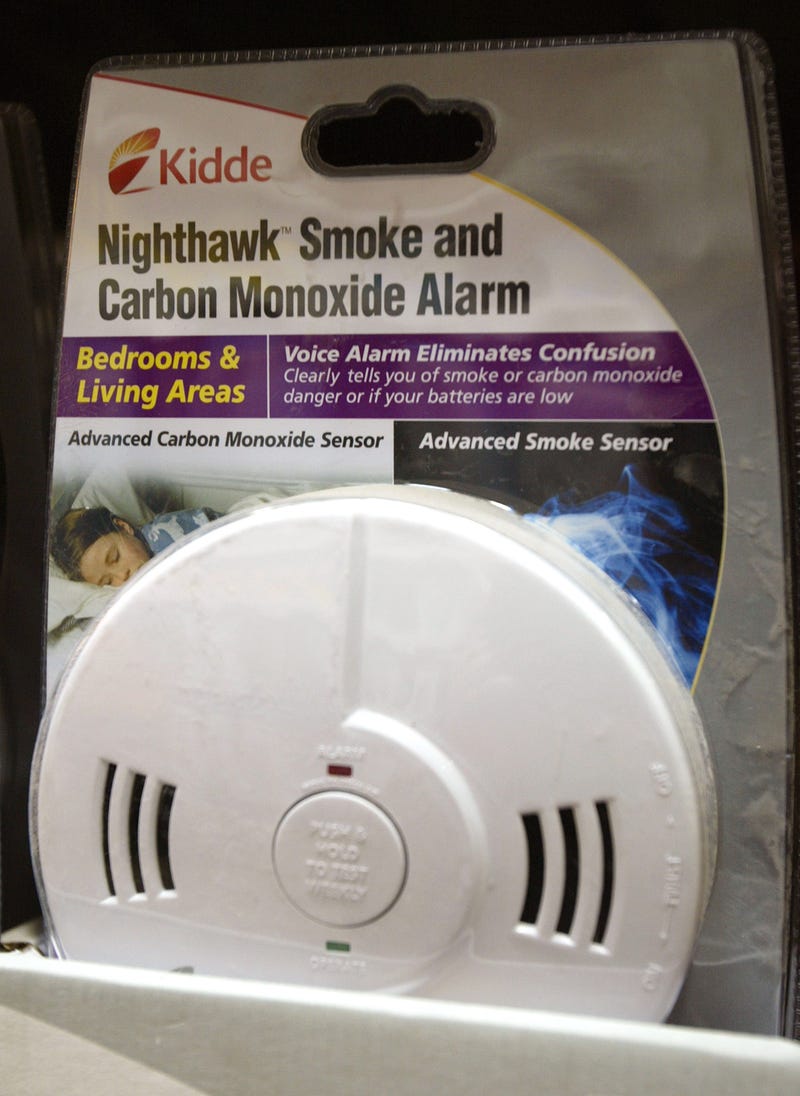
Minnesota Senator Amy Klobuchar is trying to raise awareness about the dangers of carbon monoxide poisoning, as we head into the colder winter months.
Klobuchar highlighted her bipartisan legislation during a news conference on Thursday to prevent carbon monoxide-related deaths.
The Nicholas and Zachary Burt Memorial Carbon Monoxide Poisoning Prevention Act is intended to help states adopt tougher standards to ensure carbon monoxide detectors are safe and reliable.
The legislation was signed into law earlier this year, named after two brothers who passed away in Kimball, Minnesota from carbon monoxide poisoning.
Klobuchar was joined at the conference Nick and Zach’s mother Cheryl Burt.
Burt recalled a very cold night 26 year ago. She said she felt overcome, and unable to walk. She passed out and the next day her husband woke her to find that her 16 month old and 3 year old had died overnight.
Since then, she's dedicated her life to raising awareness about the dangers of the deadly gas, even going before Congress in 2009.
"When you have carbon monoxide in your home, you cannot see it. You cannot taste it. You cannot smell it. You will feel its effects – a headache, nausea, dizziness – but you don't realize that you're being poisoned," she told Congress.
"I had smoke alarms in my home. I used safety gates and child locks, and I thought my home was safe. I was wrong. On this particular evening, I progressively got sicker and sicker, with what I thought was a family-sized case of the flu," she testified.
Carbon monoxide poisoning kills roughly 430 Americans each year and sends 20,000 to emergency rooms. Children are particularly susceptible.
Minnesota has seen its share of death from carbon monoxide poisoning.
"In the last five years, we've lost 59 people to carbon monoxide poisoning," said Chief T. John Cunningham, the Fire Chief and Emergency Management Director for the City of Brooklyn Park, Minnesota.
"And when you look at those numbers, 23% of those deaths are in our African American population. So our brothers and sisters are disproportionately affected."
He also said with energy costs up, people are turning to non-traditional methods of heating.
"We see people trying to use creative means to save money and sometimes that's putting gas powered appliances in places they are not designed for."
And if you're setting up your ice fishing house, a word of caution.
"You have to keep those heated. Put the carbon monoxide detector in there," he said. "Keep those combustible devices well ventilated and follow manufactures instructions. You know we certainly cannot stress that enough."
Another issue is triple threat of the flu, COVID and RSV. Those illnesses can often look similar to carbon monoxide poisoning.
"As you get more CO in your system, you might be experiencing nausea or vomiting, shortness of breath or confusion. And at the end when you build up more and more in your system, you lose consciousness."
Klobuchar was joined by some of Minnesota’s fire chiefs from Duluth, Moorhead, Brooklyn Park and Rochester.
Press release;
Klobuchar, Advocates, Fire Chiefs Offer Tips on Preventing Carbon Monoxide-Related Deaths
Klobuchar’s bipartisan legislation to implement tougher safety standards for carbon monoxide detectors was signed into law earlier this year
WASHINGTON - U.S. Senator Amy Klobuchar (D-MN) held a virtual press conference to highlight the importance of preventing carbon monoxide related deaths. Klobuchar led the bipartisan Nicholas and Zachary Burt Memorial Carbon Monoxide Poisoning Prevention Act, which was signed into law earlier this year. Named after two young brothers from Kimball, Minnesota who tragically passed away from carbon monoxide poisoning, this legislation will help states adopt tougher standards to ensure carbon monoxide detectors are safe and reliable.
Klobuchar was joined by carbon monoxide poisoning awareness advocate and mother to Nicholas and Zachary, Cheryl Burt; Minnesota State Fire Chiefs Association President and Brooklyn Park Fire Chief T. John Cunningham; Duluth Fire Chief Shawn Krizaj; Moorhead Division Fire Chief Chad Stangeland; and Rochester Assistant Fire Chief Holly Mulholland.
“As more Minnesotans turn on their heaters, it’s good to talk about the progress we’ve made and what we can do going forward to help prevent tragedies from carbon monoxide poisoning,” said Klobuchar. “In order to adequately address this danger, we need common sense safeguards in place. That’s why I was glad to see my bipartisan legislation —named in honor of Cheryl’s sons—signed into law earlier this year. The law will help prevent tragic deaths by providing funding to install carbon monoxide detectors… and educate the public on the dangers of carbon monoxide.”
According to the Centers for Disease Control and Prevention, at least 430 people in the U.S. die each year from carbon monoxide (CO) poisoning and approximately 50,000 people are forced to seek medical attention for accidental CO poisoning. The risk of poisoning associated with running an automobile engine in an attached garage or burning charcoal in the house is especially dangerous.
Currently, the Consumer Protection Safety Commission (CPSC) has voluntary standards, set by Underwriters Laboratories. The Nicholas and Zachary Burt Memorial Carbon Monoxide Poisoning Prevention Act authorizes the CPSC to provide resources to states to encourage the use of carbon monoxide detection devices and establish a federal grant program to help states carry out a carbon monoxide poisoning prevention education and awareness program.
The Centers for Disease Control and Prevention (CDC) offers the following tips for avoiding carbon monoxide poisoning include:
• Install a carbon monoxide detector in the house, and check or change its batteries every six months;
• Never leave a car running while parked in a garage or any enclosed space;
• Never run a car, a generator, or any gasoline-powered engine inside a basement, garage, or other enclosed structure, even if the doors or windows are open;
• Having a qualified technician inspect and service all gas, oil, or coal burning appliances each year;
• Call 911 or a health care professional right away if you suspect carbon monoxide poisoning.
